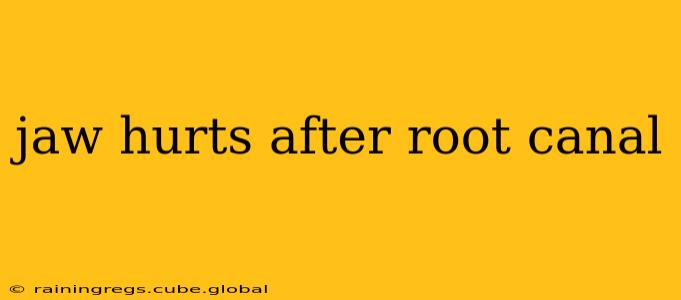A root canal, while designed to alleviate tooth pain, can sometimes leave you with jaw discomfort afterward. This isn't necessarily a cause for alarm, but understanding the potential reasons and how to manage the pain is crucial for a smooth recovery. This comprehensive guide will address common concerns and provide valuable insights into post-root canal jaw pain.
Why Does My Jaw Hurt After a Root Canal?
Several factors can contribute to jaw pain following a root canal procedure. The most common reasons include:
-
Inflammation: The root canal procedure, while minimally invasive, involves inflammation of the tissues surrounding the tooth. This inflammation can spread, causing temporary jaw muscle soreness and stiffness.
-
Referred Pain: Pain often doesn't originate precisely where it's felt. The nerves in your jaw are closely interconnected, meaning pain from the treated tooth can radiate to your jaw. This referred pain is common after dental procedures.
-
Temporomandibular Joint (TMJ) Issues: Pre-existing TMJ problems can be exacerbated by the root canal procedure, leading to increased jaw pain. The procedure itself doesn't usually cause TMJ dysfunction, but it might trigger symptoms in those already susceptible.
-
Muscle Strain: The procedure may involve holding your mouth open for an extended period, potentially leading to muscle strain in your jaw. This strain can manifest as soreness and stiffness, especially in the days following the treatment.
-
Infection: While rare after a properly performed root canal, a persistent or recurring infection can contribute to jaw pain. This is often accompanied by other symptoms like swelling and increased sensitivity.
How Long Does Jaw Pain After a Root Canal Last?
The duration of jaw pain varies considerably depending on individual responses and the underlying cause. Generally, mild discomfort and soreness should subside within a few days to a week. However, persistent or severe pain warranting a call to your dentist could persist for several weeks.
What Can I Do to Relieve Jaw Pain After a Root Canal?
Several self-care strategies can help alleviate post-root canal jaw pain:
-
Over-the-counter pain relievers: Nonsteroidal anti-inflammatory drugs (NSAIDs) like ibuprofen can effectively reduce pain and inflammation. Always follow the recommended dosage instructions.
-
Ice packs: Applying ice packs to the affected area for 15-20 minutes at a time, several times a day, can help reduce swelling and numb the pain. Never apply ice directly to the skin; wrap it in a thin towel.
-
Warm compresses: After the initial 24-48 hours, warm compresses can help relax tense jaw muscles. Apply warm compresses for 15-20 minutes at a time, several times a day.
-
Gentle jaw exercises: Your dentist may recommend gentle jaw exercises to help restore range of motion and reduce muscle tension. Avoid strenuous activity.
-
Soft food diet: Stick to a soft food diet for the first few days to minimize any discomfort while chewing.
Is Jaw Pain After a Root Canal Normal?
Some level of jaw discomfort after a root canal is considered normal, particularly in the initial days following the procedure. However, severe, persistent, or worsening pain is not typical and should prompt a call to your dentist.
When Should I Call My Dentist About Jaw Pain After a Root Canal?
Contact your dentist immediately if you experience:
- Severe pain that doesn't respond to over-the-counter pain relievers.
- Increased swelling or redness in the jaw area.
- Fever or other signs of infection.
- Difficulty opening or closing your mouth.
- Numbness or tingling in your jaw or face.
These symptoms may indicate a complication requiring prompt professional attention.
Can a Root Canal Cause Long-Term Jaw Pain?
While most jaw pain resolves quickly, in rare cases, it can persist for a longer duration. This might be due to underlying TMJ issues, incomplete root canal treatment, or another unrelated dental problem. If you experience prolonged jaw pain, it's essential to consult your dentist to rule out any underlying issues and explore appropriate treatment options. Regular dental checkups are essential for maintaining oral health and addressing any potential problems early on.
